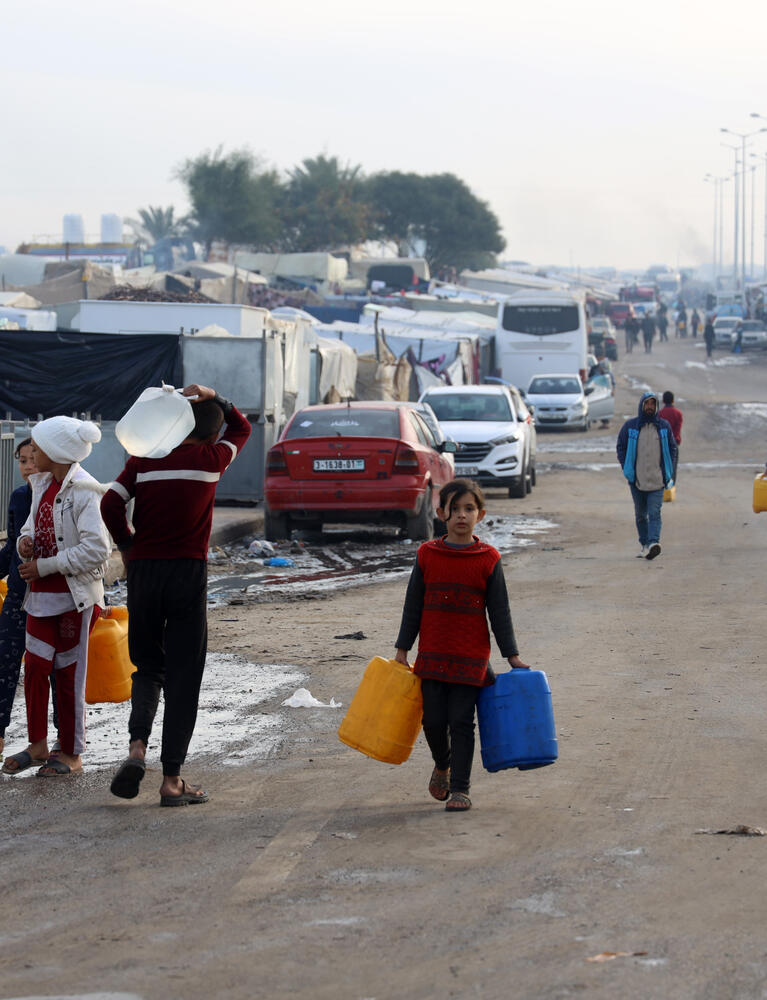The long line is visible from afar, hundreds of people of all ages, most of them holding distinctive yellow or blue 40-litre jerrycans. Some live in tents close to the water truck that attracted the crowd to this spot in Rafah, a town in the south of the Gaza Strip. Others live in shelters up to several kilometres away, and brought wheelchairs, hand trucks, shopping carts and even strollers to carry the vital resource back to their shelters. One visually impaired man has come with his young daughter – the girl leading the way, her father carrying the water. They walked two kilometres to get here, for there is no clean water in Al-Mawasi, the coastal area where they are living.
Since the war began in Gaza four months ago, little infrastructure has been spared by the near-incessant airstrikes that have struck the enclave, including water pipes. According to Unicef, at least half of the water and sanitation facilities in Gaza have been destroyed or damaged, while UNWRA reports that around 70 per cent of the population of Gaza are drinking salinized or contaminated water.
Palestinians in Rafah on the Egyptian border – once a town of 300,000, but now hosting 1.5 million displaced people from all over Gaza – struggle to find clean water for drinking, cooking or washing. Living conditions for people in this part of the enclave are desperate – a result of the overcrowding and of the lack of clean water, toilets, showers and sewerage systems, aggravated by the cold winter weather.
Flu, skin diseases, diarrhoea
“We have noticed that, due to the lack of clean water for drinking or other uses, patients suffer from intestinal disorders and the flu virus, which is circulating widely,” says MSF health promotion manager Mohammad Abu Zayed. “Lately, we’ve also witnessed children suffering from skin rashes due to the lack of clean water for bathing or washing.”
Other health risks include dehydration and hepatitis A. "The lack of clean water can lead to many diseases related to the quality of the water, such as diarrhoea and skin diseases, but simply not having enough water can also lead to dehydration," says MSF medical advisor Marina Pomares, in Gaza. Cooking and personal hygiene are also affected, increasing the risk of infection. "The effects are worse in children, who have weaker immune systems than adults, and are more exposed to diseases and allergies," she says.
MSF teams are providing basic healthcare in two locations in Rafah. As of 2 February, almost 30 percent of morbidities of patient under five-year-olds coming to the MSF Shaboura clinic and Al-Mawasi health post were for diarrhoea or skin diseases. In recent weeks MSF teams in Rafah have also received 43 patients with suspected hepatitis A. These medical conditions are all related to the shortage of clean water and are compounded by the lack of functioning medical facilities in the area.
To respond to some of the most urgent needs of the displaced people in Rafah, Médecins Sans Frontières teams started a water distribution programme in December 2023. Today, MSF water and sanitation teams are providing an average of 110,000 litres of safe drinking water per day to around 20,000 people. However, this is nowhere near enough to go around. “In a normal situation, one person needs two to three liters of drinking water per day,” says MSF water and sanitation agent Youssef Al-Khishawi. “Now, with the current shortage, the average for one family of six is one gallon of water (3.8 litres).”
Hanin fled her home in Gaza City in the early days of the war due to shelling and is now sheltering in Rafah. Like most people in the town, she struggles to get hold of enough food, water and other essentials. "We stand in lines to get water,” she says. “If we get the chance to get some water, we will use it for washing and dish-washing, and if we can’t get any water, we will wait for the next day.”
MSF is ready to scale up the amount of water distributed, but other types of shortages stand in the way of the process, such as the limited number of trucks allowed into the enclave carrying aid and fuel. “The main challenge we face in distributing water is the lack of fuel to pump and transport it,” says Al-Khishawi. “The second is the lack of proper roads for our trucks to drive on, because there are tents even on the asphalt. The third is that there are no water distribution points – even they have been bombed. Water pipes, streets and infrastructures are destroyed.”
MSF reiterates its calls for a sustained ceasefire, which is the only way for people in Gaza to return to their homes. It also calls for the flow of humanitarian aid into Gaza to be restored and scaled up so as to ensure people have access to essential items such as food, water and healthcare.



